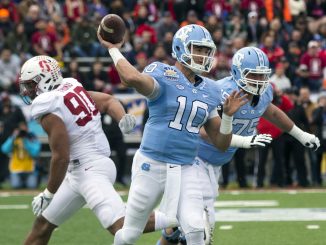
The ACC has managed to stay above the fray when it comes to the debate over North Carolina’s House Bill 2. But that changed Monday when the NCAA announced its decision to relocate seven championship events including the first and second rounds of its men’s basketball tournament out of the state in response to the controversial “bathroom” law. Forced to take a stand on the issue by the NCAA’s action, commissioner John Swofford said in a statement that the ACC will now also consider pulling its championship events out of North Carolina. “The decision by the NCAA Board of Governors to relocate all current, and not award any future, NCAA Championship sites in the state of North Carolina continues to build upon the negative impact this bill has already had on the state,” Swofford said. “HB2 was previously scheduled to be thoroughly discussed at this week’s ACC Council of Presidents meeting, so it would be premature to make any decisions or announcements regarding ACC Championships until our membership is able to discuss. The league’s longstanding commitment to equality, diversity and inclusion will continue to be a central theme to our discussions.” Fifteen of the ACC’s 22 championship events are scheduled to be played in North Carolina during the 2016-17 academic year. The highest profile of those events is the league’s football title game at Charlotte’s Bank of America Stadium on Dec. 3. The ACC has a history of relocating its championship over political issues. In 2009, the league pulled its baseball tournament out of Myrtle Beach and banned all further events in South Carolina over that state’s flying of the Confederate flag over its state house. The flag has since come down and the ban has been lifted. While the decision on North Carolina future as an ACC championship host will be determined by a vote of the conference’s 15 university presidents, Swofford’s statement included an ominous sign as to how that vote might go. “On a personal note,” he said. “It’s time for this bill to be repealed as it’s counter to basic human rights.” HB2 deals with, among other things, the authority of local governments to impose anti-discrimination laws on private business. Its most controversial provision requires that in publicly owned buildings, individuals use the multi-stall restroom facilities designated for the sex listed on their birth certificate if a single-stall “family” restroom is not available. The law came in response to an ordinance passed by the Charlotte city council in February 2016 that prevented facilities open to the public from differentiating any bathrooms or locker room facilities by sex. The ordinance did this by eliminating the exception of such facilities from existing anti-discrimination rules, which state that businesses cannot discriminate based on race, sex, and other factors. Eliminating the exception for restrooms essentially meant all of them became gender neutral, setting off a political and cultural firestorm. The NBA has also moved its 2017 All-Star Game from Charlotte to New Orleans because of HB2.



